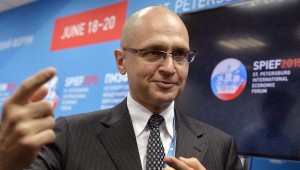
The list of reasons for Russia’s current economic crisis includes, but is far from limited to, cheap oil, international sanctions, Crimea, and military campaigns in Donbass and Syria. Bankers and oilmen are lining up to feed at the public trough, which is only possible thanks to the “fat” accumulated over the past years. There is a rumor that even Russia’s gold reserves will only last for twenty years or so. All hopes are riding on Gazprom and the arms and nuclear industries or, in other words, on the Soviet-era legacy state monopolies.
ROSATOM CEO Sergei Kiriyenko thus described the state corporation’s achievements to Russian Prime Minister Dmitri Medvedev: “Our stock of orders has increased 5.5 times over the past several years and currently includes 30 nuclear power units in 12 countries; other 10 powers units are under negotiation. Currently, our stock of orders totals $300 billion”. However, according to ROSATOM’s presentation at the June 2015 ATOMEXPO Forum, the company was expecting its overseas orders portfolio to reach $150 billion by 2020. Thus, over a few months only, this figure has magically doubled. The company is also to sign contracts for $13 billion before the end of the year. Russia has been declared to be “basically the only country encouraging the creation of nuclear industries from scratch in different regions of the world”. The list of the state corporation’s main clients includes, but is not limited to, developing countries such as Malaysia, Bolivia, Kenya, Ghana, Indonesia. ROSATOM owns property all over the world, including in Washington DC. Despite the sanctions, the United States continues to be ROSATOM’s long-time and irreplaceable partner. Russia supplies about 20 percent of US nuclear power plants’ demand for uranium fuel. New contracts have recently been signed for the total amount of around $6 billion.
The international sanctions, however, are having some impact on the US-Russia cooperation. According to ROSATOM’s official website, in March 2014, the US Department of State announced that certain projects were being put on hold. Also, “in May 2014 the formation of the plan of activities to be undertaken by US national laboratories and Russian nuclear industry enterprises was suspended on the initiative of the American side”. On the other hand, according to US media, Russia unilaterally abandoned its cooperation with the United States on ensuring the safety and physical protection of highly enriched uranium and weapon-grade plutonium.
The cooperation between Russian nuclear scientists and their American colleagues sometimes gets overshadowed by scandals. In the spring of 2015, the media claimed that investors affiliated with ROSATOM donated tens of millions of dollars to the Clinton Foundation while then-Secretary of State Hillary Clinton’s office was involved in approving a Russian bid for the purchase of the Uranium One company associated with uranium production in Kazakhstan.
Just recently, as a result of the seven-year-old anticorruption probe conducted by the US Department of Justice, Vadim Mikerin, director of Techsnabexport, which is the Pan American Department of ROSATOM, pleaded guilty to giving kickbacks to US suppliers and to money-laundering.
There are enough corruption scandals in Russia itself. Suffice to mention the criminal case against top managers of the Siberian chemical plant near Tomsk (a part of ROSATOM), embezzlement of funds allocated for the  construction of FGUP Atomflot facilities, and many other such cases. In 2010, 35 ROSATOM managers at different levels lost their jobs on suspicion of corruption and official misconduct. In 2011, 12 such cases were reported. In 2011, Transparency International Russia presented a study of corruption risks in ROSATOM’s activities. As a result of an analysis of open sources only, violations were found in 83 out of 200 analyzed contracts. ROSATOM’s irreplaceable CEO Sergei Kiriyenko’s business empire is built in a traditionally Russian model, under which his son, friends and former partners were involved in business activities in cities and areas connected with the head of the clan’s professional activity.
construction of FGUP Atomflot facilities, and many other such cases. In 2010, 35 ROSATOM managers at different levels lost their jobs on suspicion of corruption and official misconduct. In 2011, 12 such cases were reported. In 2011, Transparency International Russia presented a study of corruption risks in ROSATOM’s activities. As a result of an analysis of open sources only, violations were found in 83 out of 200 analyzed contracts. ROSATOM’s irreplaceable CEO Sergei Kiriyenko’s business empire is built in a traditionally Russian model, under which his son, friends and former partners were involved in business activities in cities and areas connected with the head of the clan’s professional activity.
By emphasizing the state corporation’s successful export activities and multi-billion revenues, Kiriyenko is at the same time lobbying for a new federal target program for nuclear and radiation safety for 2016-2025. The implementation of this program demands 400 billion rubles, with 280 billion coming from the federal budget. Given Russia’s corruption-based reality, it is still unclear how much of this money will get stolen, just as it is still unknown what share of foreign assets and ROSATOM’s estimated revenues the former shareholders of Yukos will receive under the ruling issued by the Hague’s arbitration. Considering the colossal environmental risks associated with the nuclear industry, future public revenues anticipated by Mr. Kiriyenko are questionable.





